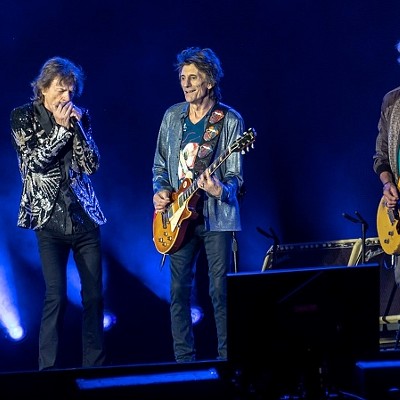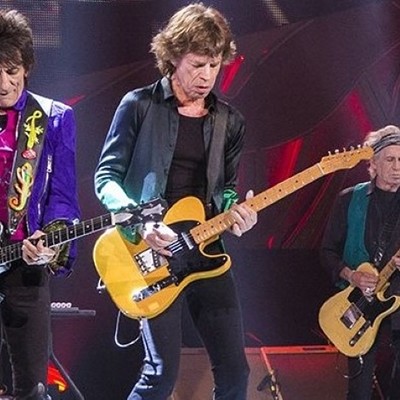Black Panther arrives in theaters this weekend, and you are no doubt keenly aware of this fact. This is for a few reasons. One, Marvel’s marketing push has been both brilliant and strong. Two, the film boasts a near-perfect score on Rotten Tomatoes (no easy feat for a comic-themed affair) and is going to bank some major box office in the coming weeks.
Finally, and not to be dismissed, is something that doesn’t directly involve the movie at all. Black Panther: The Album dropped last week, and this certainly bears mentioning as it pertains to Black Panther: The Movie. For one, Kendrick Lamar – the biggest hip-hop star in the game today – curated and contributed to the album. Secondly, he brought some friends with him; Black Panther: The Album is absolutely loaded with stars, including but not limited to the aforementioned Kendrick, Future, The Weeknd, SZA, Vince Staples, Schoolboy Q, and 2 Chainz.
Most importantly, not only is Black Panther: The Album stacked with talent, but said talent actually delivers. Simply put, this isn’t some mailed-in attempt to piggyback on the inevitable success of the Black Panther movie. Rather, Black Panther: The Album is a standalone entity, featuring such triumphs as “All the Stars” and “Pray for Me,” which would be hits regardless of their cinematic affiliation.
This is refreshing. It is also an ever-increasing rarity.
Once upon a time, soundtracks set the table for their cinematic counterparts. Hell, on many an occasion, these soundtracks actually outpaced their cinematic siblings in both commercial success and cultural weight. History is littered with killer soundtracks to average movies. Dangerous Minds. Judgment Night. Dead Presidents. City of Angels. Awesome soundtracks, average movies. Even Garden State, once a coming-of-age tale for a generation, has waned significantly in hindsight, while its soundtrack still resonates.
This is no great surprise. Music, more so than cinema, makes people feel. These feelings can be sad, glad, bad, or any combination of the three. And, when produced correctly, this music can not only elicit feelings from listeners, but also actively encourage them to cough up their money for a movie ticket. This is no easy feat, but it’s one Black Panther: The Album has down pat; it is not alone in this regard.
If anything, in hindsight, soundtracks can actually serve as representative models of their accompanying movies. Take The Bodyguard soundtrack, for instance. The Bodyguard, released in 1992, is not a particularly good movie. Co-stars Whitney Houston and Kevin Costner have virtually zero chemistry, the plot is hokey and the film drags on far too long. And yet, despite critical feedback that can kindly be labeled as a mixed bag, The Bodyguard was a certifiable smash at the box office. It was one of the highest-grossing films of 1992 and only further elevated Costner and Houston’s respective standings.
Now, some of this certainly attributable to Houston and Costner themselves. At the time of the film’s release, Costner was one of the biggest, most recognizable movie stars on the planet, and an Academy Award-winning director and producer to boot. Houston, meanwhile, already had three multiplatinum albums to her name and was one of the biggest pop stars in the world. This certainly bears mentioning, considering The Bodyguard’s soundtrack featured Houston covering Dolly Parton’s “I Will Always Love You.”
The song was an absolute smash, one that propelled The Bodyguard soundtrack to multiplatinum status. Houston’s version of “I Will Always Love You” not only remained at No. 1 for weeks on end in the U.S., but hit the top spot in damn near any country with a radio station; it also certainly played a role in the success of its cinematic counterpart. Other examples of this phenomenon certainly exist.
Titanic was a global supernova, one that made Leonardo DiCaprio and Kate Winslet household names, a film that, for a time, was the highest-grossing in the history of cinema. Much of this can be attributed to DiCaprio and Winslet’s chemistry, James Cameron’s direction, and the film’s real-life storyline. But some of the credit must go to the film’s soundtrack, and in particular, Celine Dion’s “My Heart Will Go On,” the biggest single of 1998.
The Tim Burton version of Batman helped kickstart one of the greatest franchises in comic book history, and Burton’s unique vision and Michael Keaton’s surprisingly stellar turn were certainly at play. However, the fact that Prince’s 11th studio album served as the official soundtrack to the film certainly didn’t hurt. To this day, tracks like “Partyman” and “Batdance” are synonymous with one of the biggest films of the 1980s. Hell, Prince produced the soundtrack for his own Purple Rain, and both the film and soundtrack were commercial successes.
This will likely be the case for Black Panther as well. The film’s soundtrack is poised to debut at No. 1 on the Billboard Top 200, and with great word of mouth and a top-notch cast and crew, the film itself could very well break box office records.
Music and cinema, working together in harmony. It does happen. If only it happened a little more.
Support Us
Houston's independent source of
local news and culture
account
- Welcome,
Insider - Login
- My Account
- My Newsletters
- Contribute
- Contact Us
- Sign out

Black Panther is going to rule the box office, just as its accompanying soundtrack is ruling the charts.
Photo courtesy of Marvel Studios
[
{
"name": "Related Stories / Support Us Combo",
"component": "11591218",
"insertPoint": "4",
"requiredCountToDisplay": "4"
},{
"name": "Air - Billboard - Inline Content",
"component": "11591214",
"insertPoint": "2/3",
"requiredCountToDisplay": "7"
},{
"name": "R1 - Beta - Mobile Only",
"component": "12287027",
"insertPoint": "8",
"requiredCountToDisplay": "8"
},{
"name": "Air - MediumRectangle - Inline Content - Mobile Display Size 2",
"component": "11591215",
"insertPoint": "12",
"requiredCountToDisplay": "12"
},{
"name": "Air - MediumRectangle - Inline Content - Mobile Display Size 2",
"component": "11591215",
"insertPoint": "4th",
"startingPoint": "16",
"requiredCountToDisplay": "12"
}
,{
"name": "RevContent - In Article",
"component": "12527128",
"insertPoint": "3/5",
"requiredCountToDisplay": "5"
}
]
KEEP THE HOUSTON PRESS FREE...
Since we started the Houston Press, it has been defined as the free, independent voice of Houston, and we'd like to keep it that way. With local media under siege, it's more important than ever for us to rally support behind funding our local journalism. You can help by participating in our "I Support" program, allowing us to keep offering readers access to our incisive coverage of local news, food and culture with no paywalls.
Clint Hale enjoys music and writing, so that kinda works out. He likes small dogs and the Dallas Cowboys, as you can probably tell. Clint has been writing for the Houston Press since April 2016.
Contact:
Clint Hale
Trending Music
- Houston Concert Watch 4/24: Rolling Stones, Bad Bunny and More
- Top 10 Butt-Rock Bands of All Time
- An OG Beatles Fan Proves She Loved Them—Yeah, Yeah, Yeah!
-
Sponsored Content From: [%sponsoredBy%]
[%title%]

Don't Miss Out
SIGN UP for the latest
Music
news, free stuff and more!
Become a member to support the independent voice of Houston
and help keep the future of the Houston Press FREE
Use of this website constitutes acceptance of our
terms of use,
our cookies policy, and our
privacy policy
The Houston Press may earn a portion of sales from products & services purchased through links on our site from our
affiliate partners.
©2024
Houston Press, LP. All rights reserved.





